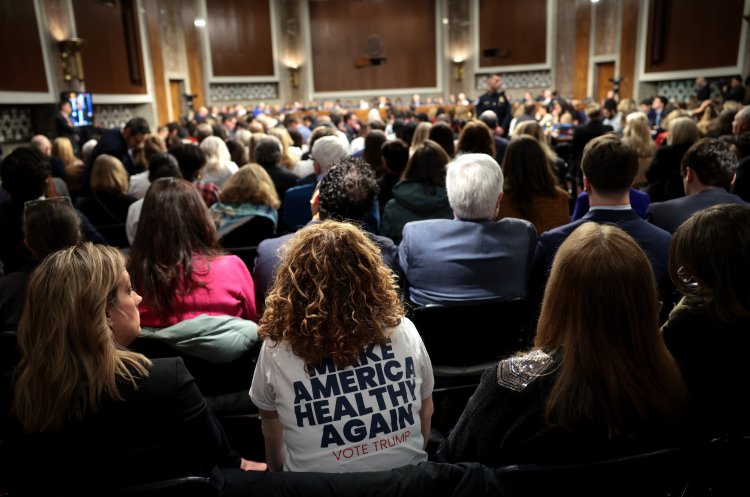How MAHA Claims to Save Americans but is Actually Poisoning Them -- Editorial
The deregulatory approach of the Trump administration is compromising the health objectives set by MAHA.

Kennedy’s “Make America Healthy Again” initiative is built around concerns regarding toxic chemicals in food, water, and medicine—positions that resonate with many. Yet, Kennedy and his supporters have largely remained silent as the Trump administration pursues policies that facilitate increased pollution and corporate power. This lack of response highlights a broader inconsistency.
The goals of MAHA and similar movements advocating for safe food, protection from harmful chemicals, and enhanced public health autonomy fundamentally rely on a robust regulatory environment. However, their support has unwittingly contributed to an increasingly deregulatory agenda under President Donald Trump, which actively undermines the institutions essential for realizing these objectives.
This paradox is not unique to MAHA; it echoes a historical pattern in American politics where populist sentiments are often co-opted by neoliberal or authoritarian agendas that ultimately undermine those very sentiments.
In the late 1800s, American agrarian populists vigorously opposed monopolies and financial elites while simultaneously expressing deep skepticism towards government, viewing it as an extension of the same powers they opposed. This ambivalence made segments of the movement vulnerable to exploitation by free-market advocates, who portrayed government as the primary oppressor, advocating for deregulation as a panacea. This deregulation, however, perpetuated corporate influence, leaving farmers and workers in even more precarious situations.
Fast forward a century, and the rise of Reagan-era neoliberalism showcased a similar trend. The conservative right harnessed public discontent with bureaucratic inefficiency and corruption, promising to free Americans from supposed government overreach. Reagan famously articulated this when he said, “The nine most terrifying words in the English language are 'I'm from the government and I'm here to help.’”
This framing resonated not only with corporate stakeholders but also with many working-class citizens feeling alienated from elite governance. Yet, the reality following these promises was not a reduction in government control but rather an unchecked expansion of both government and corporate power, manifesting in heightened incarceration rates and predatory corporate behaviors. Deregulatory policies of the 1980s catalyzed industrial consolidation, environmental decline, and an escalating disparity between the affluent and the working class—trends that contribute to today's unprecedented economic inequality and oligarchy, exemplified by figures such as Elon Musk.
A similar phenomenon is unfolding with MAHA and related health freedom movements. While they highlight legitimate issues—corporate control of regulatory bodies, hazardous environmental exposures, and a profit-driven medical system—they have aligned with an agenda actively eroding the protections necessary for public health and democratic rights, thereby exposing the populace to increased manipulation and exploitation by wealthy interests.
Prominent figures in MAHA, including Kennedy, Jillian Michaels, Calley Means, and other alternative health advocates, center their platforms on the assertion that America's food supply poses significant health risks. They criticize the presence of additives, dyes, and pesticides in processed foods and advocate for state intervention to prohibit SNAP benefits for sodas and candies. They further point to Europe’s more stringent regulations as a model and raise alarms about the dangers of endocrine disruptors, calling for tighter regulations on food and medicinal products. As some dismiss MAHA’s efforts as unfounded, an expanding body of scientific consensus validates their concerns as urgent in addressing the shortcomings of the U.S. public health system.
Despite this alignment with pressing health issues, the movement has supported an administration that is actively dismantling critical health protections. Under Trump, the EPA has declared it will disregard the social costs associated with pollution in policymaking, removed restrictions on mercury emissions and other pollutants linked to significant health risks, and moved to revoke the regulatory power over greenhouse gases—actions that exacerbate systemic health threats.
This situation is not merely an oversight; it is indicative of a MAHA movement that selectively targets its adversaries—critically approaching public health institutions while often allowing corporate polluters to evade scrutiny. Despite some calls for regulation, MAHA tends to frame its issues in terms of governmental overreach and consumer choice, which facilitates support for policies that decimate regulatory agencies under the guise of promoting "freedom," even when such policies exacerbate the very issues they claim to address. The ramifications of MAHA’s contradictions are likely to have dire consequences for both the movement's objectives and the vulnerable populations adversely affected by the Trump administration’s changing policies, such as the EPA rollbacks.
MAHA stands at a crucial juncture historically. Previously, the justification for deregulation stemmed from neoliberal ideology—the belief that free markets should dictate the distribution of resources. While this outlook has negatively impacted public health, environmental safeguarding, and democratic engagement, it still operated on the premise that the state should serve as an impartial mediator in corporate matters for the public good.
Today's wave of deregulation diverges from neoliberal ideology; it aims to systematically dismantle public institutions not for market optimization but to consolidate oligarchic power. Trump’s actions epitomize this, from hosting sales events for Tesla on the White House lawn to leveraging government contracts for his political allies. To facilitate this authoritarian fusion of business and governance, Trump’s second term is explicitly focused on undermining the legitimacy and funding of regulatory and public health institutions. The EPA’s dismissal of climate science as mere “religion” exemplifies this trend, as does the ongoing erosion of agencies like the NIH and CDC.
This distinction is crucial. Neoliberal deregulation, while disastrous, at least allowed for technocratic discussions about efficiency. In contrast, the current authoritarian trend disregards the need for justification for its choices or avenues for public engagement, maintaining that the state plays no role in corporate regulation or environmental protection. By collaborating with this agenda, MAHA risks becoming a facilitator of a movement disinterested in genuine public health.
For a truly populist health movement to emerge—one that delivers on the commendable promises of the MAHA agenda—it must pivot away from individual consumer choices, such as purchasing organic goods or avoiding vaccinations, and instead address the broader political and economic factors underpinning health outcomes. It should advocate for a regulatory framework that prioritizes accountability for corporations rather than engaging in piecemeal and often ineffective regulations. Additionally, it must understand that robust environmental policies, labor protections, and public health systems are essential components of its mission rather than distractions.
Above all, it should resist the reactionary politics that have allowed today’s health freedom movement to serve as a vehicle for corporate deregulation. Instead of attacking the very institutions that could contribute to the public good, MAHA would benefit from advocating for reforms that make these institutions more democratic, responsive, and aligned with the needs of ordinary citizens.
History teaches us that movements often start with valid complaints but can be redirected to support policies that exacerbate those very issues. The current challenge is to ensure that the push for health does not turn into yet another instance of this historical pattern. If MAHA and its supporters are genuinely committed to public health, they must cease aligning themselves with forces aiming to dismantle its remaining safeguards. The alternative path does not lead to freedom; it leads to systemic harm, both literally and politically.
Steven K Lee for TROIB News
Find more stories on Business, Economy and Finance in TROIB business












